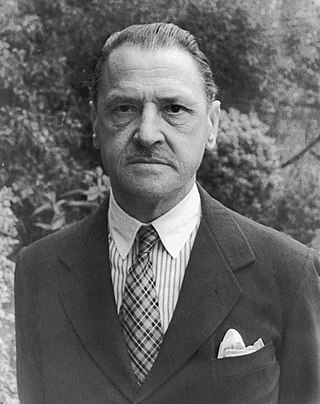
William Somerset Maugham was an English writer, known for his plays, novels and short stories. Born in Paris, where he spent his first ten years, Maugham was schooled in England and went to a German university. He became a medical student in London and qualified as a physician in 1897. He never practised medicine, and became a full-time writer. His first novel, Liza of Lambeth (1897), a study of life in the slums, attracted attention, but it was as a playwright that he first achieved national celebrity. By 1908 he had four plays running at once in the West End of London. He wrote his 32nd and last play in 1933, after which he abandoned the theatre and concentrated on novels and short stories.

She Stoops to Conquer is a comedy by Oliver Goldsmith, first performed in London in 1773. The play is a favourite for study by English literature and theatre classes in the English-speaking world. It is one of the few plays from the 18th century to have retained its appeal and is still regularly performed. The play has been adapted into a film several times, including in 1914 and 1923. Initially the play was titled Mistakes of a Night and the events within the play take place in one long night. In 1778, John O'Keeffe wrote a loose sequel, Tony Lumpkin in Town.
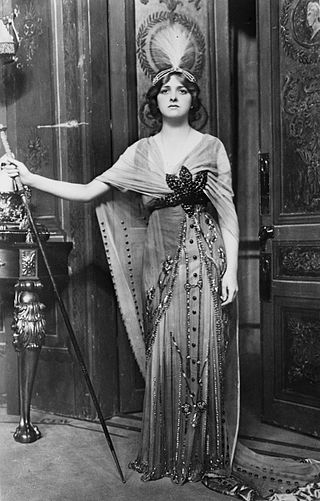
Dame Gladys Constance Cooper, was an English actress, theatrical manager and producer, whose career spanned seven decades on stage, in films and on television.

Dame Edith Mary Evans, was an English actress. She was best known for her work on the stage, but also appeared in films at the beginning and towards the end of her career. Between 1964 and 1968, she was nominated for three Academy Awards.

Susan Hampshire, Lady Kulukundis, is an English actress. She is a three-time Emmy Award winner, winning for the television dramas, The Forsyte Saga in 1970, The First Churchills in 1971, and for Vanity Fair in 1973. Her film credits include During One Night (1961), The Long Shadow (1961), The Three Lives of Thomasina (1963), Night Must Fall (1964), Wonderful Life (1964), The Fighting Prince of Donegal (1966), The Trygon Factor (1966), The Violent Enemy (1967), Malpertuis (1971), Living Free (1972), Neither the Sea Nor the Sand (1972) and Bang! (1977).

Edward Somerset, 4th Earl of Worcester, KG, Earl Marshal was an English aristocrat. He was an important advisor to King James I, serving as Lord Privy Seal.
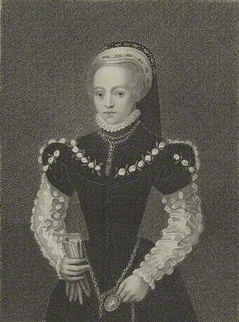
Anne Seymour, Duchess of Somerset was the second wife of Edward Seymour, 1st Duke of Somerset, who held the office of Lord Protector during the first part of the reign of their nephew King Edward VI. The Duchess was briefly the most powerful woman in England. During her husband's regency she unsuccessfully claimed precedence over the queen dowager, Catherine Parr.
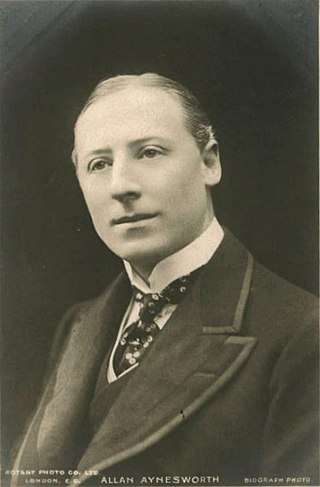
Edward Henry Abbot-Anderson, known professionally as Allan Aynesworth, was an English actor and producer. His career spanned more than six decades, from 1887 to 1949, and included the role of Algernon Moncrieff in the 1895 premiere of Oscar Wilde's The Importance of Being Earnest.

The Constant Wife, a play written in 1926 by W. Somerset Maugham, is a comedy whose modern and amusing take on marriage and infidelity gives a quick-witted, alternative view on how to deal with an extramarital affair.

Dame Irene Boucicault DBE, née Barnes, known professionally as Irene Vanbrugh was an English actress. The daughter of a clergyman, Vanbrugh followed her elder sister Violet into the theatrical profession and sustained a career for more than 50 years.
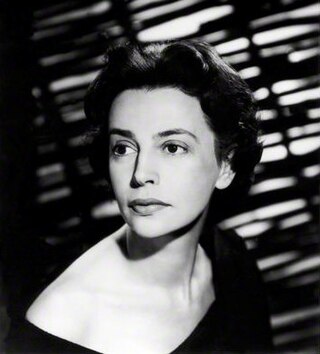
Gwendoline Watford, professionally known after the mid-1950s as Gwen Watford, was an English actress.
Major Sir John Arnold Wallinger was a British Indian intelligence officer who led the Indian Political Intelligence Office from 1909 to 1916. As a colonial policeman and counter-intelligence officer he became a specialist in countering those opposed to British rule in India, operating both in India and in England.
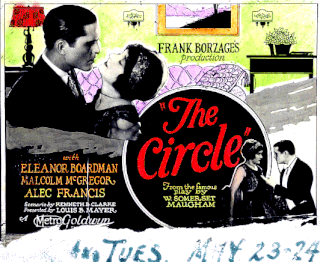
The Circle is a 1925 American silent romantic comedy film directed by Frank Borzage. The film stars Eleanor Boardman, Malcolm McGregor, and Alec B. Francis. A young Joan Crawford appears in the film's opening scene and later in a photograph viewed by other characters. The screenplay, written by Kenneth B. Clarke, was based on the 1921 play of the same title by W. Somerset Maugham.

Lottie Venne was a British comedian, actress and singer of the Victorian and Edwardian eras, who enjoyed a theatre career spanning five decades. Venne began her stage career in musical burlesque before moving into farce and comedy. She appeared in several works by each of F. C. Burnand and W. S. Gilbert and was often in plays with Charles Hawtrey later in her career.

For Services Rendered is a play by Somerset Maugham. First performed in London in 1932, the play is about the effects of World War I on an English family.

Lydia Bilbrook, sometimes credited as "Bilbrooke", was an English actress whose career spanned four decades, first as a stage performer in the West End, and later in films. She is best known to today's audiences as "Lady Ada Epping" opposite comedian Leon Errol in the Mexican Spitfire movie comedies of the 1940s.

Minnie Gertrude Ellis Jeffreys was an English actress, best known for her comedy roles.

Strictly Unconventional is a 1930 American pre-Code drama film directed by David Burton, written by Sylvia Thalberg and Frank Butler, and starring Catherine Dale Owen, Paul Cavanagh, Tyrell Davis, Lewis Stone and Ernest Torrence. It was released on May 3, 1930, by Metro-Goldwyn-Mayer. It is based upon the 1921 play The Circle by W. Somerset Maugham.

Lady Frederick is a comedy by the British writer W. Somerset Maugham, written early in his career. The play was first seen in London in 1907, and was very successful, running for 422 performances. The title role was played by Ethel Irving. In New York it was first performed in 1908, with Lady Frederick played by Ethel Barrymore, who reprised her role in the play's film adaptation, The Divorcee.

Otho Stuart was a British actor of the late 19th and early 20th centuries who specialised in performing in the plays of Shakespeare. Stuart played the range of Shakespearean leading men, both with the Company of F. R. Benson and with his own Company during his management of the Adelphi Theatre in London. Of independent means, he used his own money to help finance Benson's productions and his own. The theatre critic J. C. Trewin described him as 'one of the handsomest Oberons of all time.'




















